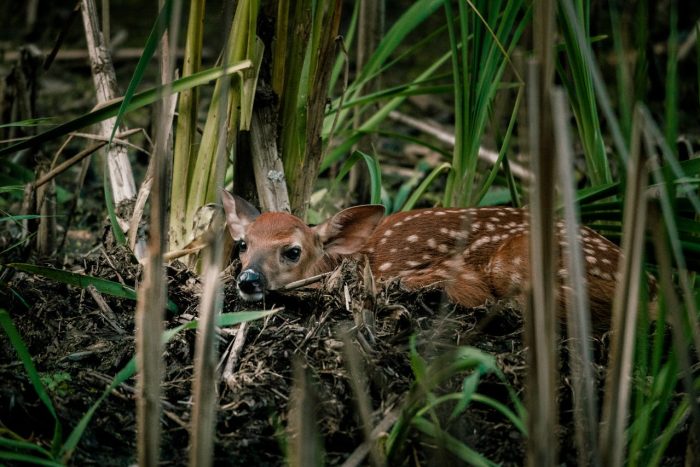Rebel Hearts: Even Gentleness can Demand Defiance.
Burrowed beneath the tall blades of unmown grass, a newborn fawn the size of a rabbit lay hidden—so small, so silent, I missed him entirely as I returned home, still burning hot from a meeting where my ideas had been torn to shreds.
Critiques of my work were a constant occurrence in my everyday profession, but this instance rubbed me raw that day.
I came inside and tossed my purse and backpack on the dining room table, desperate to hug my person and feel some solace.
In the backyard, I found DJ watering my wildflowers, which still hadn’t bloomed. We finally had a cozy backyard, lush green grass to ground in, and a garden just barely starting to grow tall. Its welcoming beauty was a stark contrast from the ceiling falling down in our kitchen and the fridge that stopped working on our anniversary weekend.
“Did you see the baby deer resting by the mailbox?” DJ asked excitedly.
It was over a year ago he encouraged me to admire a “fuzzy dear” eating grass near my childhood home. Instead, I tore his head off saying I didn’t care because my dad was experiencing his final days less than a mile from the fuzzy deer.
“No,” I said. I hadn’t noticed. I was too busy letting marketing collateral critiques erode my peace. But I made a promise to DJ—that day when my dad was dying—that I would always stop to admire the fuzzy deer, even when things were devastating.
So, I passed through the garage, entered the front yard, and there it was. Curled up in the cool grass, ears tucked low to its body, a white-speckled coat colored a deep reddish brown. It took everything in me to not scoop it up and cuddle it like it was my own.
The little tyke couldn’t have been more than a day old. Its mother was bedded down across the street in the neighbors yard, monitoring me with watchful eyes. I think she knew I wasn’t a threat.
As I spoke to the fawn, muttering what a “sweet baby” it was, a call from my mother came through.
“You okay?” She asked. “That was a rough meeting.”
“No,” I said. “I’m incredibly upset. I feel like I just got bullied into submission. I feel like I was coming from a community mindset rather than a personal one and I just got punished for it.”
As a person who’d been bullied most of her upbringing—and hated seeing the vulnerable be bullied—the more I thought about it, the angrier it made me.
I wish I would’ve stood up for myself much more than I did.
“There’s a baby deer in the front yard,” I told her fifteen minutes after I finished venting, already knowing what she would say next.
“Remember to be gentle,” she said.
It was a common reply in our family, and derived from a Ted Andrews book on the symbolism of animals. The way deer roam our county, maintaining the gentleness of deer was always a common theme in our home, even when things weren’t always gentle.
And the world has certainly been anything but gentle these days.
Children, mothers, fathers, brothers, and sisters are being ripped from their families by fire and force. I struggle with what it means to peacefully protect yourself and the things you love when you’re already fragile, bullied, beaten, and ready to raise hell.
My friend and I watched the fawn from my front porch, rooting for it to get up and work those little legs while its mother chased off nearby bucks. We must protect what’s important, fragile, and vulnerable at all costs.
My friend and I named the fawn Dale, not really knowing if it was male or female. Dale was just what came to us.
That night, I was in and out of sleep. Getting up to peer through windows and check on Dale. Around midnight, I walked across the dark street to observe it from a safe distance. It hadn’t moved much, and when it did, it couldn’t make it over the curb to where its mother rested.
For Dale, learning to walk was just as tiring as the work of being a human that cares.
Between midnight and dawn, I placed a crate five feet away from it, alerting oncoming drivers that something precious nestled in the crevice of the curb—an act the game warden would later shame me for doing. But people drive carelessly on these small town roads and I needed to protect Dale.
Please be careful. A precious baby deer is learning to walk! It read.
By morning, Dale and its mother were nowhere to be found. And of all the things I endured, and would endure that week, I was happy to see he’d found a path to somewhere else. Hopefully it was somewhere better than here.
When the weekend hit, things felt heavier than normal. Our Colorado town brought the energy of large scale protests in major cities to small streets, protesting fascism and dictatorship. Over 11 million people woke up, drank their morning coffee, and donned their best walking shoes, choosing to shout their opposition with kindness and love.
If 77 million voted for hate and violence, where were they on No Kings Day?
Amidst that, I was still grappling with this life without my father, wondering if his spirit knew what was coming and chose to pass to the next realm rather than experience what the world is right now.
On Sunday, when the sun was high and blazing, our friend group chat rang with new and concerned texts. Dale had returned.
“What should I do about this massively injured fawn?” Our friend said, sending a picture of it bedded down in their cactus garden just along the curb. One friend said to call Colorado Parks and Wildlife while another noted it had been walking strangely. Being the optimist and lover of vulnerable things, I argued that he was just brand new to this world and trying to find the ground beneath its feet.
The friend that found him drew attention to its perceivably warped legs and the way it hobbled when it walked, joking that we could keep it and have a pet deer, an option I had seriously considered.
We must protect what’s fragile and vulnerable at all costs.
After reading those texts, I immediately walked to the street corner, motherly concern racing through me. Dale had moved beneath a growing fruit tree next to a bowl of water my friend had placed there. Finally…a bit of a shade in the Colorado heat. I took note of its mother, who was feeding in a nearby empty lot near our home.
Moms often leave their babies in patches of grass or beneath trees while they feed. It’s completely normal, or so I researched. But still, I couldn’t help but call the number Google fed me in case of an injured wildlife emergency. They rehabilitate injured wildlife all the time, surely someone would help Dale. When I connected with state patrol he graciously offered to pass the note along to the local game warden.
By that evening, I’d been mourning the heinous deaths of Minnesota strangers and what their family and friends were enduring; sang “Where Rainbows Never Die” to father and wherever his spirit might be; and had a conversation with a very annoyed game warden who assured me that Dale’s case—which was similar to four other calls he had received that day—was completely normal.
Taking his word for it, that night I laid next to my sweet partner, hoping the plaster sagging from the lath above his side of the bed wouldn’t fall on him like it did in our kitchen. And, somehow, within the chaos of the world, I found rest.
But the following morning brought news I wasn’t prepared for.
“The fawn died in the gutter last night,” our friend said in an early morning text. He said it very matter of fact—a nature I appreciate about him—and shared a picture of the burial site he dug for it that morning.
“It was pretty terrible. When I was getting in my van, the mom walked over to it, licked it, and just walked away.”
It was a reality I refused to believe and it wrecked me beyond belief. Dale left this world almost as soon as he came, but I pushed the thought down. Trying to convince myself this was the natural order of things.
Fuck the game warden and fuck everyone else who doesn’t care about small and precious things. I thought.
While my friends and loved ones continued through life with the practical mindset that, “this was the natural order,” I couldn’t help but use Dale’s death to draw parallels with current times.
I couldn’t let it go.
Why hadn’t the game warden believed me? Why was he so annoyed that I wanted to help something small and fragile? Was its little life not worth saving? Had we decided that some lives are too small to matter? This fawn had breathed, had nuzzled at its mother’s side—why wasn’t that enough?
Why do we stand by while families are torn apart, while oceans of tears go unnoticed?
How did we decide that cages and cells are more appropriate than seats at our dinner tables, that vulnerability is inconvenient, that fragility is a problem to be ignored or erased?
Why is empathy radical? Why is love something to be mocked, or dismissed, or beaten down?
I ask these questions not because I have the answers, but because they haunt me.
My therapist, gentle and kind, tells me, “It’s not just a fawn. These feelings are real and powerful.” She’s right. It wasn’t just a fawn. In that moment, the fawn was me—small, unprotected, desperate for comfort.
When we stand up peacefully, when we fight with love, why are we punished, called naïve, or worse—oppressors? Why do so many turn away as people are cast out, caged, and left to suffer?
Why is violence our fallback, and not compassion?
I speak as a woman defending something I created, as a would-be protector to a helpless creature, as a person whose empathy is not a weakness, but a way of being alive.
We’re always asked to pick a side. Some say protecting what’s vulnerable is foolish or impractical. Others, like me, believe it’s the only way forward. When we care for the fragile, when we fight for empathy and love, we make survival possible—not just for ourselves, but for everyone.
The choice is simple, even if it’s hard: to choose the side of empathy, even when the world tells us not to.
Keep a vigil for our vulnerable. Look for those in need—creature, person, or idea—and offer them protection. Empathy is a radical act, and choosing it isn’t always easy, but it matters.
And let’s be clear: standing up for what’s right doesn’t always have to be passive. Speak out and defend the fragile—even when your voice shakes, even when you’re told to sit down, even when it’s yourself you’re defending. If you’re reading this, you’re already part of the change. Let’s keep choosing love—boldly, relentlessly—even when it feels impossible.
Rest in paradise, Dale.
~


 Share on bsky
Share on bsky





Read 0 comments and reply